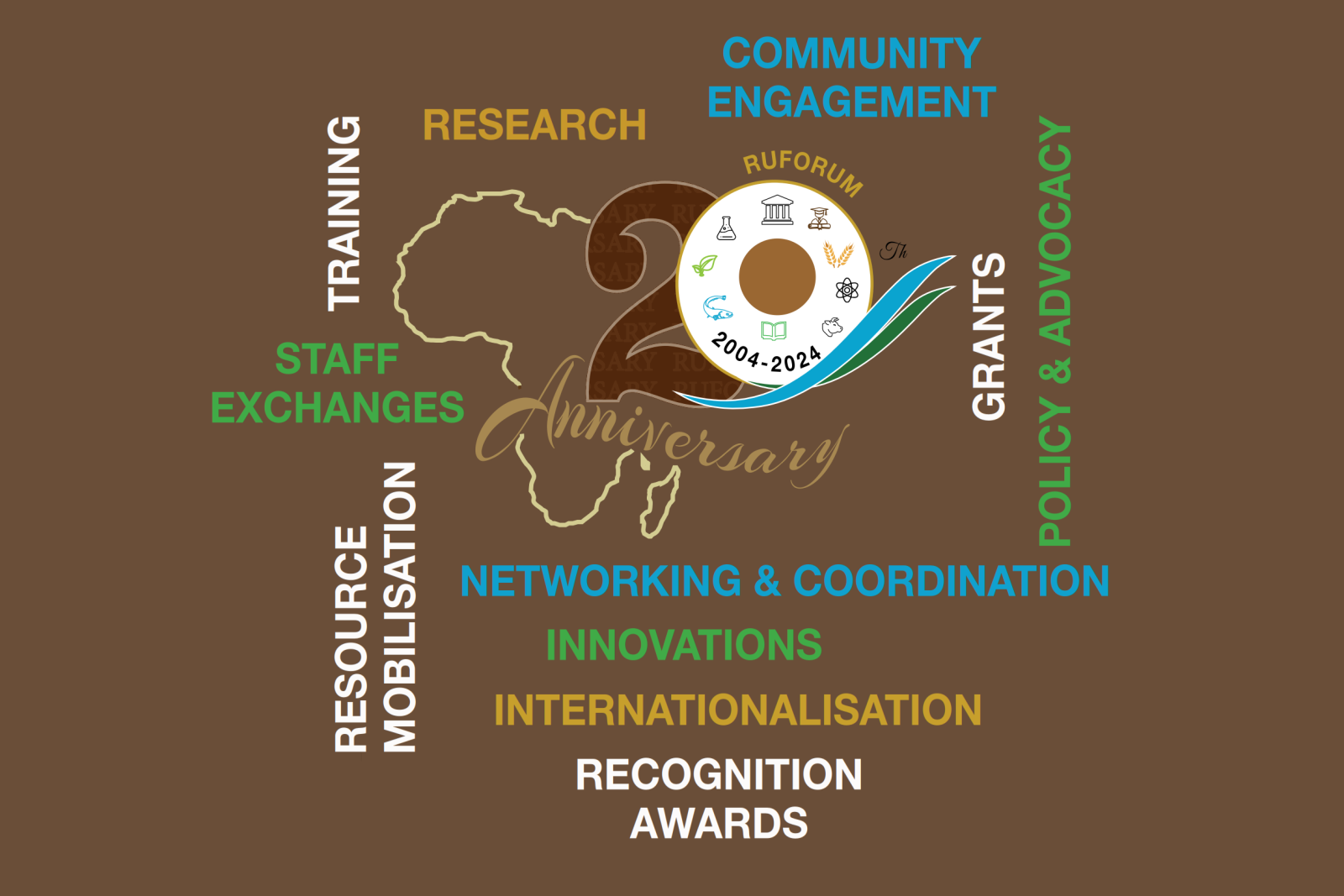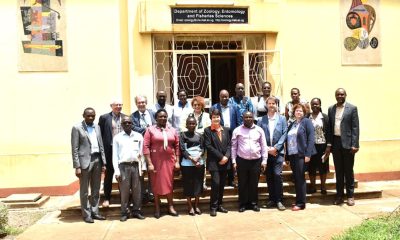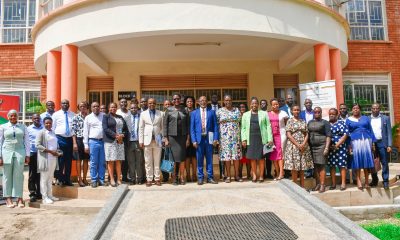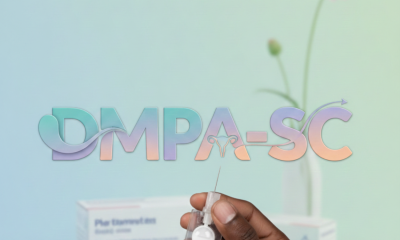Dear esteemed reader,
I bring you warm greetings from the RUFORUM Secretariat, here in Kampala, Uganda. The year 2024 marked a milestone in RUFORUM’s journey of contributing towards enhancing our continent’s development leveraging on our natural strength of agriculture and allied sub-sectors of the economy. At 20 years of age, RUFORUM remains focused on its core mission of enabling Africa University effectively and efficiently generate relevant solutions to underpin the continent’s transformative development aspirations. In this issue, I am pleased to provide you with an overview of RUFORUM’s journey during the past two decades as we celebrate its 20th anniversary. While doing so, I found it crucial to look retrospectively from the perspectives of the FORUM on Agriculture Resource Husbandry (alias FORUM), RUFORUM’s predecessor; the past two decades of RUFORUM, and to look at the future of Africa’s Agricultural transformation, economic growth and higher agricultural education.
The Forum for Agricultural Resource Husbandry – FORUM
FORUM was a capacity development program established in 1992 by the Rockefeller Foundation that was implemented in five countries (Kenya, Malawi, Mozambique, Uganda and Zimbabwe), Foundation’s focus countries’ at the time. The countries faced unique as well as shared challenges and opportunities at that time. Uganda and Mozambique had just emerged from conflict, whilst Kenya, was expanding its university education to meet the growing demand, while Zimbabwe was a young country post independence. All these countries had also been affected by the effects of macroeconomic structural adjustment programming that had limited funding for university education especially, post-graduate education. The FORUM initiative initially focused on crop sciences gradually expanding to other disciplines of agriculture. At inception FORUM’s programmes aimed “to build national and local capacity in crop management research with capability to develop alternative management-variety-resource combinations, soil fertility and biological practices, agroforestry technologies, pest management approaches and related crop management techniques; and evaluate the biological, economic and ecological effects”. FORUM was implemented through competitive grants to support student training at the master’s degree level. To deliver on its mission, FORUM utilized interdisciplinary, participatory and system-level approaches and worked with stakeholders beyond universities including agricultural research institutes, civil society, private sector and smallholder farmers. The FORUM Secretariat was initially headquartered in Lilongwe, Malawi and later relocated to Nairobi, Kenya.
Achievements of the FORUM that underpin RUFORUM
- Institutional strengthening
- FORUM helped stabilize colleges, faculties and schools of agriculture in Kenya, Malawi,
Mozambique, Uganda, and Zimbabwe by providing resources, mission and peer support, during and after the structural adjustment programmes. It also contributed to staff retention in the participating universities and built their capacity for research, student supervision, scholarly and policy works.
- The program contributed to institutional development by creating high quality graduate training programmes whose research agenda directly addressed problems facing smallholder based agriculture.
- Enhancing networking and engagement with other ecosystem actors
- FORUM actions catalyzed collaboration among universities and with other education and
research for development actors including a broad range of farmers. This enhanced relevance and contribution of University led research and training to national development.
- Over its life FORUM enabled the creation and nurture of an Africa Institution for the benefit of
Africa. This resulted in building the capacity of institutions and individuals that have progressively contributed to the continent’s economic growth.
- Science solutions for development
- FORUM strengthened the contribution of its members to knowledge generation, one hundred
twenty three publications done in international and regional peer reviewed journals. The
publications covered crop improvement, plant protection, soil sciences, economics and social
sciences.
- Scientists supported by the productivity enhancing technologies such as improved bean and
soybean and cowpea varieties, a highly effective seed-dressing innovation for the control of bean fly, a soil fertility improvement technology called ‘Prep-Pac’ that combines a slow release rock phosphate, a nitrogen source (urea) and an inoculant.
- Training the next generation of scientists:
- There was significant improvement in the completion rate of graduate level training reducing the completion time from 4-7 to 2 years as required in masters degrees by course work and research.
- One hundred eighty eight (188) students were trained in east and southern Africa.
- Twenty-three percent of the graduates enrolled in a PhD program while 54% were employed,
presumably, often because of contacts/relationships they developed during their training.
From FORUM to RUFORUM
After a decade of implementation (1992 – 2002), the Rockefeller Foundation supported the creation of an African led and owned organization that was called, “ The Regional Universities Forum For Capacity Building in Agriculture-(RUFORUM). RUFORUM thus naturally became the successor of The Foundation’s investments for building the Capacity of African Universities to effectively engage in growth of the continent’s Agriculture sector. It initially, focused on Eastern and Southern Africa as its zone of influence before growing to become a continent wide agency that it is today. The new RUFORUM Secretariat was established in Kampala, Uganda hosted by the Government via Makerere University, one of its founder members following a successful bidding by Uganda through Makerere University.
The RUFORUM’s first decade journey (2004 – 2014)
The first decade focused on consolidation of FORUM achievements and expansion both sub-regionally and continentally. The growth was guided by a new strategic plan underpinned by a new vision of “Vibrant agricultural innovation systems with fully integrated universities that play a leading role in nurturing the systems through high-performing agricultural science graduates who are innovative and responsive to changing demands”. The RUFORUM network grew to include 32 universities from its initial ten members in 2004 drawing membership from three regions of Africa (Eastern, Central and Southern Africa). It expanded the scope of operations, to include PhD training as well as institutional and leadership strengthening. RUFORUM maintained most of FORUM training, networking and scaling agenda involving principal investigators, students, academic leaders (Principals and Deans), as well as collaboration with non-university stakeholders. New governance organs were created to stabilize the organization and strategic partnership forged. Consequently by the end of the first decade, RUFORUM had emerged as a key continental agency in capacity building for agriculture and policy information that it still is today. The new regional PhD and master’s degree programmes that focused on emergent areas, catalyzed the resurgence of African University in development processes and practice.
RUFORUM’s second decade (2014 – 2024)
The second decade journey saw a steady growth in both scale and scope. The network’s operations expanded to cover all university training programmes, i.e. Bachelors, Masters and doctoral degree. To address the question of a rebalanced human resource pyramid, work transitions for fresh graduates and gender and diversity asymmetry, especially of underserved demographics, RUFORUM expanded its scope of actions to include Technical, Vocational, Education and Training (TVET), entrepreneurship, gender and inclusion, and future of work activities. Science was strengthened by the introduction of post-doctoral training. The new thrust required expansion of the stakeholder ecosystem to include farming communities, private sector and partners in the Global North and Global South. By December 2024, the network had 175 member universities in 40 of Africa’s 55 countries from all five geographic regions of Africa. To strengthen service delivery and relevance, RUFORUM board in 2021 created two regional hubs (for Western and Southern Africa), eastern Africa and other regions being served through the Secretariat.
At continental level, in 2014, RUFORUM signed a cooperation agreement with the African Union Commission (AUC) to support implementation of the Science, Technology and Innovation Strategy for Africa (STISA, 2024). It also entered various memoranda with key continental agencies in the global north and south respectively, during the same period. In 2024, an MoU with the AUC’s Department of Agriculture, Rural Development, Blue Economy and Sustainable Environment (ARBE) to support its agricultural growth and transformation flagship programs was signed.
During its second decade, RUFORUM implemented its first operational plan (2018 – 2022) that was aligned to regional policy development frameworks such as Agenda 2063 – The Africa We Want of AUC, “The Comprehensive Africa Agriculture Development Programme (CAADP), Malabo Declaration, the Continental Education Strategy (CESA), the Continental Strategy for Technical and Vocational Educational and Training (TVET), and the Science Agenda for Agriculture in Africa (S3A); among others. RUFORUM’s operations were framed by its continental strategy, Vision 2030 that leverages on the continent’s higher education and agriculture ecosystems to create and unlock opportunities for wealth and jobs especially for young people. During the same period, RUFORUM in partnership with the Mastercard Foundation launched the flagship program “Transforming African Agricultural Universities for Africa’s Growth and Development” (TAGDev Phase 1 (2016 – 2024) now in its second phase (2024 – 2034). TAGDEv aims to transform African agricultural universities and their graduates to better respond to developmental challenges through enhanced application of science, technology, business and innovation for rural agricultural transformation.
Distinguished reader, during the second decade RUFORUM intensified its partnerships with the European Union Universities and within the continent implementing academic mobility that enabled staff and student exchange including 67 academic staff across disciplines; implementing user centered initiatives for students and agriculture value chain actors such as Community Action Research projects (CARP), and CARP+ (involving TVET), and the RUFORUM entrepreneurship challenge program (RECAP) to scale out best practices. RECAPs were implemented at over 20 other universities within the network. Member university academic staff and students also benefited from RUFORUM’s skills enhancement in community engagement, online resource use, work preparedness, entrepreneurship, scientific writing, and data management.
The RUFORUM’s Third decade journey (2024 – 2034): Looking into the future
RUFORUM begins its third decade amidst a number of major continental and global underpinnings such as the Second Ten Year Implementation plan (STYIP) of the African Union Agenda 2063, The Kampala declaration for implementation of the Comprehensive Africa’s Agriculture Development Program; The Science, Technology and Innovation Strategy for Africa, The Continental Education Strategy for Africa and several refreshed national and continental development blueprints among others. These policy instruments all point to a shared vision of a continental set to reap from its young population and endowments for its development. Pivotal to achievement of these aspirations is the need for a strong human capital base. Indeed the STYIP has already set a plan of training 100,000 PhD level scientists over this decade many of whom must be within the Science, Technology, Engineering and Mathematics (STEMs). The network certainly has a crucial role to play in that regard and has aligned its operational plan to deliver on some of these policy instruments.
A common thread running through many of the national to regional and global policy instruments is the role of science and innovation in generating solutions. Accordingly, during its third decade, RUFORUM will leverage its vast network to engage education and agriculture ecosystems actors in science for development actions. Last mile science and technology delivery mechanisms will be strengthened at country (National FORUMs) to sub-regional levels (Regional hubs), existing partnerships strengthened while new partnerships forged to serve our network in mission delivery. We shall continue to implement our transformative education agenda, cognisant of fourth industrial revolution technologies and opportunities that integrate the digital, biological, and physical sectors of the economy. We will strive to close the gender and diversity gap in our operations and enhance future of work skills development. RUFORUM will remain resolute in its mission to supporting transitions to resilient economies.
In conclusion, as we navigate through the challenges of the third decade journey, I wish to reiterate our deepest acknowledgement to all our partners and governments who continue to walk this journey with us. To the Secretariat staff, our board members and members of all RUFORUM Governance Organs and all others who supported us through this 20 year long journey, I extend my deepest appreciations and wish everyone a happy and prosperous New Year 2025.
Thank you.
Prof. Patrick Okori
Executive Secretary
View Newsletter on RUFORUM


 General1 week ago
General1 week ago
 Natural Sciences1 week ago
Natural Sciences1 week ago
 Agriculture & Environment1 week ago
Agriculture & Environment1 week ago
 Health2 weeks ago
Health2 weeks ago
 Health1 week ago
Health1 week ago














